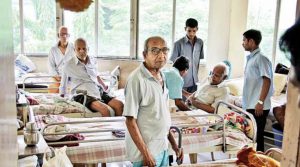They gave you everything and now it’s your turn!
 Your parents gave you everything and not just brought you into this world. They cared for you, fed you, protected you and gave up their dreams for you. These are just few things most parents provide and, in some cases, give up bringing up their children.
Your parents gave you everything and not just brought you into this world. They cared for you, fed you, protected you and gave up their dreams for you. These are just few things most parents provide and, in some cases, give up bringing up their children.
So, it’s only natural when they become old and dependent that you would do the same. I think most people would say yes but when it comes to it the reality is somewhat different?
Taking care of your parents varies from culture to culture and country to country. However, the fundamental basics of caring for your parents and supporting them does not change and most caring children would want to do the right thing for their parent in whatever way possible.
In many countries care home is now part of the society in looking after the elderly but does this take away the duty of the children to take care of their parents? The answer to this may be complicated as you expect and is even more complicated by the costs and medical conditions of each person.
Some people would choose to live in care home and have made all the preparations where as others are dependent on their children or look towards the state to provide care.
In the case of Asian people traditionally they have been dependent upon their children at old age and this has been mostly driven by culture, religion and financial circumstances of the family.
I want to explore how Bangladeshi families living in the UK care for their elderly parents and how this is being challenged by modern society and living arrangements. Traditionally a typical Bangladeshi family consisted of grand-parents, parents, uncles, aunties and all the siblings living in one household. This living arrangement is still possible in many villages in Bangladesh where the houses would be extended to accommodate the whole family, and everyone would live in the same or neighbouring plot of land.
In the UK Bangladeshi families struggle to find housing that would accommodate the whole extended family. So naturally as the children married and started having their own children, they moved out to separate accommodation and in different neighbourhoods. This arrangement is fine until the parent become old and dependent. In those circumstances taking care of your parent places a strain in many families and relationships start to break down between siblings.
Looking into different Bangladeshi families living in the UK one of the common reasons for the break down in relationship is the way we live and how modern society defines a family unit. A family living in the same household typically consists of the parent and their children. Grand parents are considered extended family living in separate household. There may be practical reasons such as accommodation space preventing people from taking care of their parents but in many cases the partner or spouse wants to live independently and does not want, they’re in laws living in the same household. So, the arguments start between couples and extends to siblings and eventually gaps appear between different members of the family.
Those who take care of the parent make the other siblings jealous and those who can’t wonder how they are fairing in the eyes of the community or their parents. This creates tension between siblings and different family members and eventually relationships break down.
So, what can we do to solve this problem and how can we support our parents just the way they looked after us when we were young? How can the community help each other and how can the government provide more support for extended family? If the answers to these questions were simple, then we would all have answers. I think families do need to make plans as early as possible before the parents become dependent. Open and honest discussions at the dinner table between families identifying different options and talking about issues and challenges could be a good start. The local council needs to have structures and support network that provides community day care for older people and this would help reduce pressures from families who are caring for their parents. The government needs to provide support to families by providing more home care nursing, making accommodation suitable for extended families or building houses that support extended families and where necessary financial support for carers.
The benefits of looking after your own parents with the support of your family, local council and government could be far greater than the care home approach with high costs and in many cases poor quality care. In western countries where the elderly is living longer the costs to society of care home is becoming challenging and, in many cases, unaffordable. This might be the right time to review our approach and fundamentally change the way we look after our parents and the elderly.
